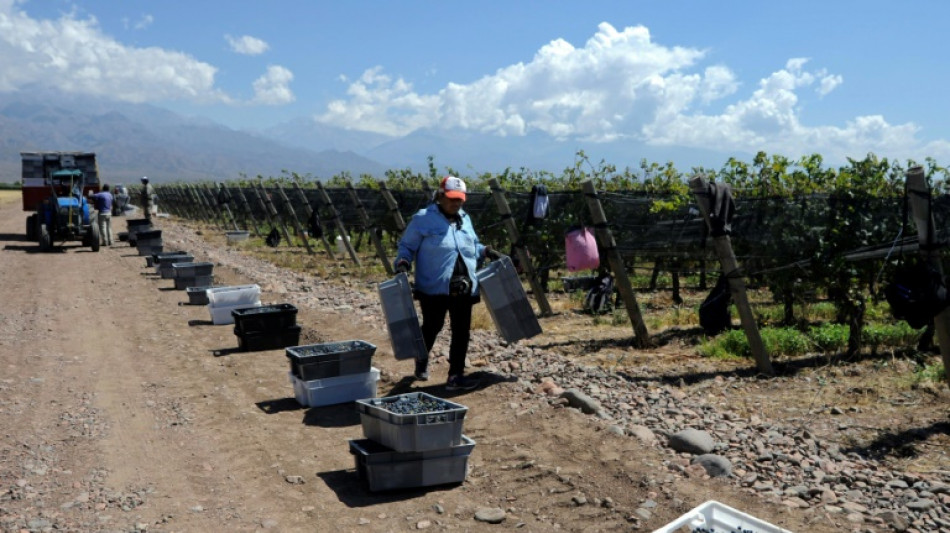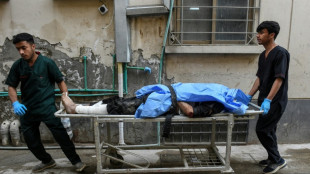
-
 Ten security officials, 37 militants killed in SW Pakistan attacks: official
Ten security officials, 37 militants killed in SW Pakistan attacks: official
-
Epstein survivors say abusers 'remain hidden' after latest files release

-
 'Full respect' for Djokovic but Nadal tips Alcaraz for Melbourne title
'Full respect' for Djokovic but Nadal tips Alcaraz for Melbourne title
-
Wollaston goes back-to-back in the Cadel Evans road race

-
 Women in ties return as feminism faces pushback
Women in ties return as feminism faces pushback
-
Ship ahoy! Prague's homeless find safe haven on river boat

-
 Britain's Starmer ends China trip aimed at reset despite Trump warning
Britain's Starmer ends China trip aimed at reset despite Trump warning
-
Carlos Alcaraz: rare tennis talent with shades of Federer

-
 Novak Djokovic: divisive tennis great on brink of history
Novak Djokovic: divisive tennis great on brink of history
-
History beckons for Djokovic and Alcaraz in Australian Open final

-
 Harrison, Skupski win Australian Open men's doubles title
Harrison, Skupski win Australian Open men's doubles title
-
Epstein offered ex-prince Andrew meeting with Russian woman: files

-
 Jokic scores 31 to propel Nuggets over Clippers in injury return
Jokic scores 31 to propel Nuggets over Clippers in injury return
-
Montreal studio rises from dark basement office to 'Stranger Things'

-
 US government shuts down but quick resolution expected
US government shuts down but quick resolution expected
-
Mertens and Zhang win Australian Open women's doubles title

-
 Venezuelan interim president announces mass amnesty push
Venezuelan interim president announces mass amnesty push
-
China factory activity loses steam in January

-
 Melania Trump's atypical, divisive doc opens in theatres
Melania Trump's atypical, divisive doc opens in theatres
-
Bad Bunny set for historic one-two punch at Grammys, Super Bowl

-
 Five things to watch for on Grammys night Sunday
Five things to watch for on Grammys night Sunday
-
Venezuelan interim president proposes mass amnesty law

-
 Rose stretches lead at Torrey Pines as Koepka makes cut
Rose stretches lead at Torrey Pines as Koepka makes cut
-
Online foes Trump, Petro set for White House face-to-face

-
 Seattle Seahawks deny plans for post-Super Bowl sale
Seattle Seahawks deny plans for post-Super Bowl sale
-
US Senate passes deal expected to shorten shutdown

-
 'Misrepresent reality': AI-altered shooting image surfaces in US Senate
'Misrepresent reality': AI-altered shooting image surfaces in US Senate
-
Thousands rally in Minneapolis as immigration anger boils

-
 US judge blocks death penalty for alleged health CEO killer Mangione
US judge blocks death penalty for alleged health CEO killer Mangione
-
Lens win to reclaim top spot in Ligue 1 from PSG

-
 Gold, silver prices tumble as investors soothed by Trump Fed pick
Gold, silver prices tumble as investors soothed by Trump Fed pick
-
Ko, Woad share lead at LPGA season opener

-
 US Senate votes on funding deal - but shutdown still imminent
US Senate votes on funding deal - but shutdown still imminent
-
US charges prominent journalist after Minneapolis protest coverage

-
 Trump expects Iran to seek deal to avoid US strikes
Trump expects Iran to seek deal to avoid US strikes
-
Guterres warns UN risks 'imminent financial collapse'

-
 NASA delays Moon mission over frigid weather
NASA delays Moon mission over frigid weather
-
First competitors settle into Milan's Olympic village

-
 Fela Kuti: first African to get Grammys Lifetime Achievement Award
Fela Kuti: first African to get Grammys Lifetime Achievement Award
-
'Schitt's Creek' star Catherine O'Hara dead at 71

-
 Curran hat-trick seals 11 run DLS win for England over Sri Lanka
Curran hat-trick seals 11 run DLS win for England over Sri Lanka
-
Cubans queue for fuel as Trump issues energy ultimatum

-
 France rescues over 6,000 UK-bound Channel migrants in 2025
France rescues over 6,000 UK-bound Channel migrants in 2025
-
Surprise appointment Riera named Frankfurt coach

-
 Maersk to take over Panama Canal port operations from HK firm
Maersk to take over Panama Canal port operations from HK firm
-
US arrests prominent journalist after Minneapolis protest coverage

-
 Analysts say Kevin Warsh a safe choice for US Fed chair
Analysts say Kevin Warsh a safe choice for US Fed chair
-
Trump predicts Iran will seek deal to avoid US strikes

-
 US oil giants say it's early days on potential Venezuela boom
US oil giants say it's early days on potential Venezuela boom
-
Fela Kuti to be first African to get Grammys Lifetime Achievement Award


Race against time to rescue Argentina wine grapes
In Argentina's Valle de Uco wine region, at the foot of the Andes, frantic picking is under way to try and save what remains of what is predicted to be the worst grape harvest in decades.
It is a race against time in the fabled Mendoza wine region in the west of the South American country once again in the grip of La Nina, a periodic weather phenomenon that cools surface temperatures and intensifies drought.
"We hurry... because we are afraid of another frost," enologist Marcelo Pelleriti of the Monteviejo winery told AFP.
"In a year like this, anything is possible," he added of "one of the most difficult (seasons) in the wine history of the province of Mendoza" where 78 percent of Argentina's wine comes from, mainly reds.
Frost, hail, extreme temperatures and drought... the vines suffered much these past months.
Cellar master Jose Mounier shows AFP the damage caused by frost at the flowering stage to a cluster of cabernet franc grapes, misshapen beyond recognition.
"Fewer grapes means more work," he explained -- with pickers having to separate healthy grapes from damaged ones by hand.
"We must still create a wine with these problems in mind," he said.
Monteviejo -- a large vineyard between 1,000 and 1,200 meters above sea level -- expects to have a harvest 50 percent smaller than last year.
Some others in the region lost everything.
- Worst harvest -
For Argentina as a whole, the 2023 harvest will not exceed 15.4 million tons of grapes, according to projections by the National Institute of Vitiviniculture (INV).
This is about 40 percent less than a "normal" year for a country that oscillates between five and seven on the world's top-ten wine producers' list.
The final numbers will be known in May. In 2021, the harvest was 22.2 million tonnes.
"We are looking at the worst harvest in more than 20 years, perhaps in 60," said Mario Gonzalez, president of the Argentine Wine Corporation (Coviar).
The country has just emerged from two good commercial wine years, linked directly to increased home consumption during the Covid-19 pandemic.
The domestic market accounts for about 70 percent of Argentine wine sales, and in 2020 and 2021 reached some 20 or 21 liters per person per year.
In 2022, that was down again to about 18 liters.
In 1977, when consumption peaked, Argentines drank some 88 bottles each on average.
The 2022 drop "will have a strong impact" on the industry, said Gonzalez..
In addition, soaring inflation -- reaching 94.8 percent in 2022 -- is eroding Argentine purchasing power.
- 'Malbec dollar' -
A worried wine sector has received a welcome boost from Economy Minister Sergio Massa in recent days.
As it did last year with soy -- the main export product of a country subject to wild exchange rate swings -- the government announced it would apply a separate, preferential rate for wine exporters more favorable than the official rate of 210 pesos to the US dollar.
It has been dubbed the "Malbec dollar" by local media.
Yet, wine producers expect the hardships will continue this coming season.
First, farmers will have to decide whether or not to replant vines that froze irreparably, keeping in mind that profitability has been on the decline for years.
And with a wary eye on a changing climate.
Spells of frost or hail that once came only about every five or ten years, said Pelleriti, now hit vineyards "in a more repetitive way."
O.Lorenz--BTB



